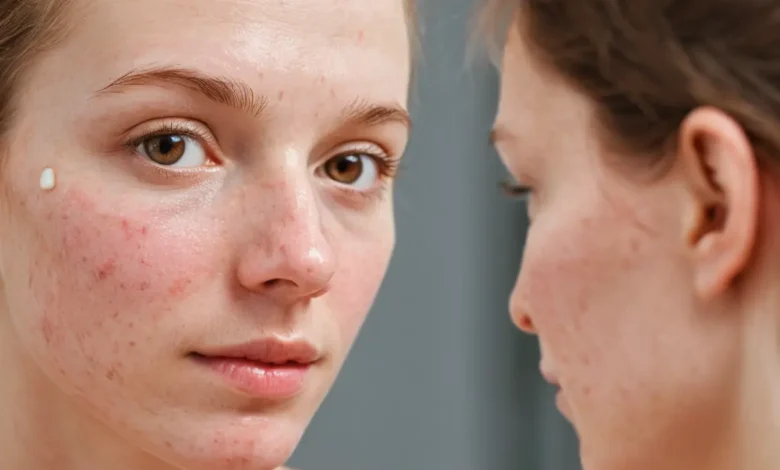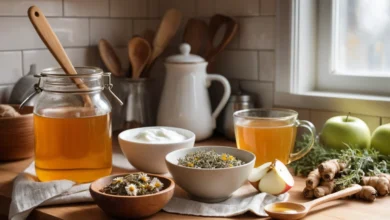Discover the Best Remedies to Clear Acne at Home: 7 Natural Solutions You Can Try Today

Dealing with acne can be frustrating, whether you’re a teenager or an adult. While there are countless over-the-counter treatments and prescriptions available, many people are turning to natural remedies for acne that are gentle yet effective. If you’re looking for ways to clear up acne at home without harsh chemicals, this article explores seven natural solutions that can help you achieve clear, glowing skin. From kitchen ingredients to herbal treatments, these remedies may just be the solution you’ve been searching for.
1. Tea Tree Oil – A Powerful Acne Fighter
Tea tree oil is a well-known and highly effective natural remedy for acne. This essential oil contains antimicrobial properties that help kill acne-causing bacteria, reduce inflammation, and prevent breakouts. It’s often used in skincare products for acne, but you can also use it directly from the bottle.
How to Use:
Dilute tea tree oil with a carrier oil (like coconut oil or olive oil) in a 1:9 ratio and apply it to affected areas with a cotton swab. Leave it on for about 15-20 minutes before washing it off. You can do this twice a day for best results.
2. Honey – The Natural Moisturizer with Healing Properties
Honey is a natural antimicrobial and anti-inflammatory agent, making it an excellent choice for acne-prone skin. It helps reduce redness, kills bacteria, and keeps the skin moisturized without clogging pores. Raw honey, in particular, is rich in antioxidants that promote skin healing and rejuvenation.
How to Use:
Apply a thin layer of raw honey directly onto your acne-prone areas and leave it on for 15-20 minutes. Rinse with warm water afterward. Honey can be used as a mask or a spot treatment.
3. Aloe Vera – Calming and Healing for Acne
Aloe vera is known for its soothing and healing properties, which makes it an ideal remedy for acne. It reduces redness, heals scars, and promotes skin regeneration. Aloe vera’s natural anti-inflammatory properties help calm inflamed acne, while its moisturizing effect keeps the skin hydrated.
How to Use:
Extract the gel from an aloe vera leaf and apply it directly to the acne spots or all over the face. Leave it on for 20-30 minutes before rinsing off with lukewarm water. You can use aloe vera gel once or twice daily for consistent results.
4. Apple Cider Vinegar – Balancing pH and Reducing Acne
Apple cider vinegar (ACV) is a popular ingredient in many homemade skincare treatments due to its ability to balance the skin’s pH level. Its acidic properties help exfoliate the skin, remove dead cells, and clear pores, reducing the likelihood of breakouts. Additionally, ACV has antibacterial properties that help combat acne-causing bacteria.
How to Use:
Dilute apple cider vinegar with water in a 1:3 ratio (1 part ACV to 3 parts water) and apply it to your skin using a cotton ball. Let it sit for about 5-10 minutes before rinsing it off. Be sure to moisturize afterward, as apple cider vinegar can be drying for some skin types. Use this remedy once or twice a day.
5. Lemon Juice – Natural Astringent and Exfoliant
Lemon juice contains citric acid, which acts as a natural exfoliant and helps lighten acne scars. It also helps balance oil production and tighten pores, which can prevent future breakouts. Lemon juice’s antibacterial properties also help eliminate acne-causing bacteria on the skin’s surface.
How to Use:
Apply fresh lemon juice directly to your acne spots using a cotton swab. Leave it on for 10-15 minutes, and then rinse it off with lukewarm water. It’s important to avoid sun exposure after using lemon juice on your skin, as it can make the skin more sensitive to UV rays.
6. Green Tea – Rich in Antioxidants for Acne Control
Green tea is packed with antioxidants, particularly polyphenols, which have anti-inflammatory and antimicrobial properties. Applying green tea to your skin can help reduce acne-causing bacteria, control excess oil production, and minimize the appearance of acne scars.
How to Use:
Brew a cup of green tea and allow it to cool. Once cool, use a cotton ball to apply the tea to your face or problem areas. Let it sit for 10-15 minutes, then rinse off. You can also place green tea bags directly onto acne spots for added benefit. Repeat this remedy once or twice a day for maximum effectiveness.
7. Turmeric – A Potent Anti-Inflammatory Herb
Turmeric has been used for centuries in skincare for its healing and anti-inflammatory properties. Curcumin, the active compound in turmeric, has been shown to help reduce acne inflammation, fight bacteria, and speed up the healing process. It also helps lighten dark spots and scars left behind by acne.
How to Use:
Mix turmeric powder with water or honey to create a paste. Apply it to the affected areas and leave it on for 15-20 minutes before washing it off with warm water. Be aware that turmeric can stain the skin temporarily, so it’s best to do a patch test first. You can use this remedy a few times a week for visible results.
Frequently Asked Questions About Natural Acne Remedies
1. Can I use these remedies if I have sensitive skin?
Yes, many of these remedies are safe for sensitive skin, but it’s essential to do a patch test first to check for irritation or allergic reactions. If you have sensitive skin, dilute ingredients like lemon juice or apple cider vinegar with more water to avoid dryness or irritation.
2. How long will it take to see results?
Natural remedies can take time to show results, typically 1-2 weeks of consistent use. Be patient and avoid overusing the remedies, as this could lead to skin irritation. With regular use, you should start noticing a reduction in acne and inflammation.
3. Can I combine these remedies for better results?
Yes, you can combine different remedies, but it’s important to keep it simple. For example, you can alternate between honey and aloe vera masks or use a green tea toner in the morning and a turmeric mask at night. However, avoid combining too many strong ingredients, like lemon juice and apple cider vinegar, as it may irritate your skin.
4. Should I stop using acne medications while trying natural remedies?
It’s important to consult a dermatologist before stopping any prescribed acne medication. You can try using natural remedies alongside your prescribed treatment, but it’s crucial to get professional advice to avoid interfering with your current skincare regimen.
Conclusion
Clearing acne at home doesn’t always require expensive treatments or harsh chemicals. With these 7 natural remedies, you can combat acne effectively while nourishing your skin with simple, accessible ingredients. Whether you choose tea tree oil for its antibacterial power, honey for its healing properties, or turmeric for its anti-inflammatory effects, these remedies offer gentle yet potent solutions for clear skin. Consistency is key, so give these remedies time to work their magic and enjoy clearer, healthier skin in the process.





